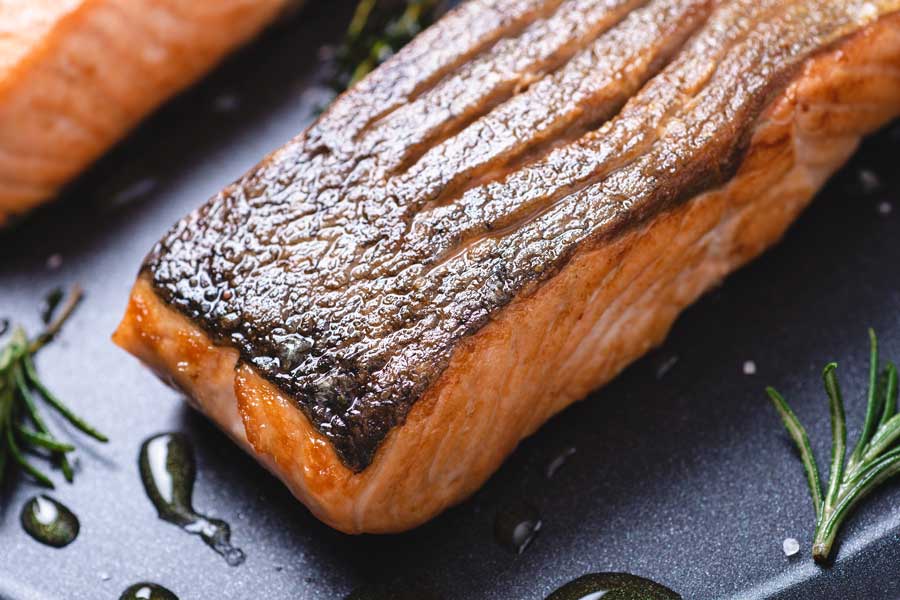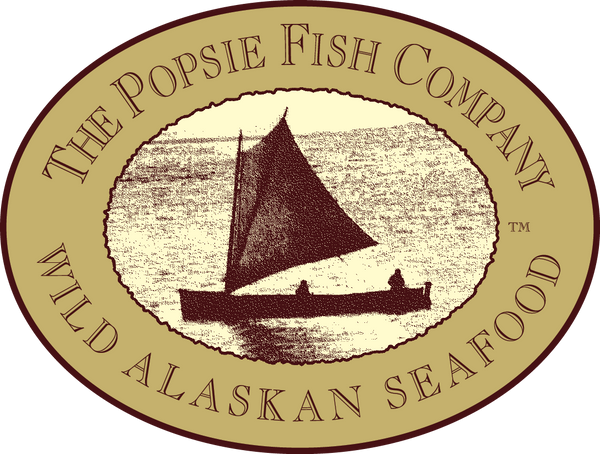
How to Pan Sear Salmon
What is pan searing
Pan searing is our go-to way to prepare wild salmon. Technically, pan searing refers just to the portion of the cooking that involves browning the fish (or meat) at high temperature. Theoretically, the fish could then be fried, braised or baked. But practically speaking, most recipes for pan searing involve not only searing the food but also pan-frying it. That’s the easy method we will explain below.
How to cut your salmon for pan searing
It’s your choice as to how you cut up your fish pieces. If you want them all to be cooked to the same degree of doneness, which is what we recommend, you will have the most control over your fish pieces if you cut, segregate and fry them according to thickness. That way you cook all similarly thick (or thin) pieces together for the same length of time. If you actually enjoy some fish well done, and some a bit raw, then you can pan sear them somewhat randomly.
Which pan will work best for searing fish?
A word about pans. A stainless steel pan is OK, but the skin or the flesh of the fish may stick to it, no matter how careful you are. A non-stick pan may work better, but you still might find that the fish sticks to it a bit. We recommend a well-seasoned cast iron pan, which cooks the fish evenly and yields a nice crustiness. We find it’s always dependable.
Getting ready to cook your salmon
In this recipe, you begin by sprinkling your wild salmon pieces with salt, pepper and garlic powder prior to cooking. Add a tablespoon or two of olive oil to a pan and heat to a medium high temperature. When the oil shimmers but doesn’t smoke, it’s ready for the fish.
Pan searing - Skin up or skin down?
We always choose to pan sear our wild salmon skin-side down. This creates a crunchy, tasty skin which contains the same nutrients found in the flesh of the fish. Consuming fish with the skin on helps ensure that those nutrients aren’t lost in the cooking process. Your body - especially your skin, your heart and your brain - will thank you. Plus you have the added benefit of an extra tasty treat!
On the flip side - literally - you can pan sear your fish skin-side up, crisping the fleshy side to a nice toastiness. Retain the skin until you remove your fish from the pan. That helps hold in the juices and keeps the healthy fat intact.
How to know when to flip your fish over
An interesting thing about wild salmon pieces is that they actually have a “window” into their doneness, so you can easily check on them as they cook. Look at your cross-section cut - your window - and you can see that as the fish cooks, it darkens on the pan side (the bottom) and is still more translucent on the top. When the fish is cooked no more than half way through, vertically, you’ll want to flip your pieces over. It will only take a minute or two now before you’ll want to remove your fish from the heat.
Making a simple Beurre Blanc sauce
Right after turning your fish pieces over, add a patty or two of butter and a bit of lemon juice to your pan. Mix the crumbs and juices around a bit. This makes your dish taste very much like you’ve added Beurre Blanc sauce, the classic French butter sauce, with almost no effort!
How to know when your salmon is done done
Watch your pan-seared fish pieces carefully after they’ve been flipped. When they still have a touch of translucence, take them out and let them rest. They’ll still continue to cook for two or three minutes off the burner.
You don’t need to use a thermometer with wild salmon because there are no health concerns with eating wild salmon at any temperature. In fact, The Popsie Fish Company salmon is sashimi grade, so you can eat it completely raw. However, if you want to check it with a meat thermometer to gauge when it's nearing doneness, the suggested cooking temperature range for wild salmon is 120°-130° F.
How to serve salmon
With the Buerre Blanc sauce that you so effortlessly created spooned over your crispy pan-fried fish, a side of steamed broccoli may be all you need for a wonderfully satisfying meal.
Enjoy!
Learn an easy method for pan-seared wild Alaska sockeye salmon with YouTube chef Adam Ragusea. Pan seared salmon is quick, healthy, and delicious!
